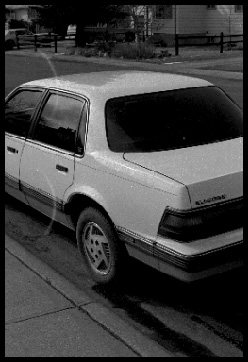By Diane McWilliams

The law states windows must have a total light transmission of not less than 28 percent through both sun screening and glazing. Any existing window tints prior to when the bill becomes law can remain, unless the total light transmission is less than 13 percent.
Proponents of a restriction on the tinting of car windows said it would increase both officer safety in traffic stops and driver safety because of better visibility, but opponents said it would be expensive for car owners to remove tints, might increase theft from car interiors and infringes on car-owners rights.
Rep. Ray Harrison, R-27/Worland, who sponsored the bill, said it has one purpose--safety. He said "both law enforcement and driver safety will increase" with a law restricting the shade of sunscreen window tint.
The two darkest shades of window tints (20 percent and 5 percent light transmission) will be the grades of sunscreen outlawed by the law, Harrison said. When these tints are applied to car windows that are already "glazed" by the factory at a usual 7 percent, the windows become very dark and completely black in the darkest tint, he added.
Harrison said cars owners will not have to remove existing tints unless the existing tint was less than 13 percent total light transmission (the darkest tint available plus the usual glazing on the glass). All other existing tints can remain on cars under a "grandfather clause" exempting existing tints, but any new applications or reapplications of tint would have to meet the new specifications of 28 percent total light transmission as of July 1, 1996.
However, Ray Gilmore of Rocky Mountain Window Tints, a local Cheyenne business, said the cost of removing window tint could run from $275 up to $800 for cars with rear-window defrosters, which would be destroyed in the window-tint removal and would need replacement. Gilmore said the tints can be removed and the glass left clear, or a lighter tint could be applied (Cost starts at around $150.) after the dark tint was removed.
Gilmore said most people desire window tint for a sunscreen, protection of interior property and/or privacy. "Some people have $3,000 in stereo equipment, and having windows that make it difficult to see that equipment decreases theft," he said.
On the other hand, Officer Richard Royce of the Cheyenne Police Department, lobbyist for the bill for the Police Protection Association of Wyoming, said police, sheriffs and especially the Highway Patrol officers support the law. "When officers make traffic stops, we are concerned about their safety," he explained. "If someone is sitting in a car and holding a gun and the car has a dark window tint, the officer could not see it (the gun), putting the officer in more danger."
However, Gilmore of Rocky Mountain Window Tints countered the bill is unconstitutional. "People for it say an officer can get shot, but anyone that's determined to shoot an officer won't be stopped by not having window tints," he said.
"What about drapes on windows? Police can't see in your windows at home if you have drapes. Will they outlaw drapes next?" Gilmore asked.
However, Officer Royce, who lobbied for the bill, said he and his group are not only concerned for officers who make a traffic stop but also for driver safety. In heavy traffic, motorists sometimes need to look through the glass in other cars to see and gauge traffic. With a dark window tint, the driver cannot do that. Also, Royce said dark tints prevent drivers from seeing out as well as with clear glass, especially at night.
Similarly, Harrison, who sponsored the bill, agreed safety is important. "Visual contact with another driver is sometimes necessary to see and anticipate what the other driver may do at, for example, a stop sign," he said.
On the other hand, Officer Terry Wiedenhaft of the Laramie County Sheriff's Department said he feels the window tint issue "has many variables." He said he agreed in some cases tints may be safer for officers, especially when transporting prisoners, but he feels tints have advantages such as cooling. "It really depends on the situation," he said, "but, personally, I would rather not see a window tint bill."